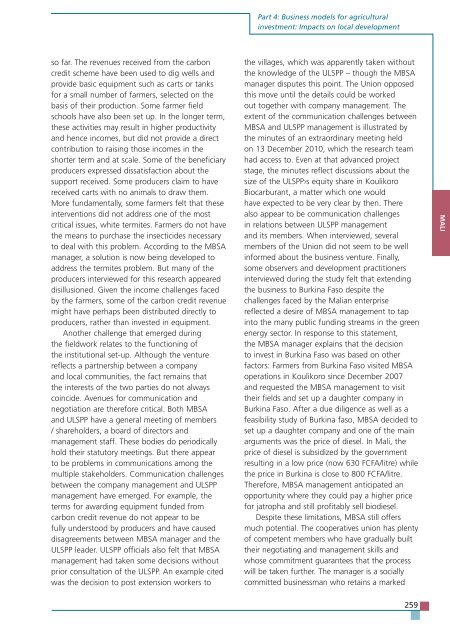TRENDS AND IMPACTS OF FOREIGN INVESTMENT IN DEVELOPING COUNTRY AGRICULTURE
TRENDS AND IMPACTS OF FOREIGN INVESTMENT IN DEVELOPING COUNTRY AGRICULTURE
TRENDS AND IMPACTS OF FOREIGN INVESTMENT IN DEVELOPING COUNTRY AGRICULTURE
You also want an ePaper? Increase the reach of your titles
YUMPU automatically turns print PDFs into web optimized ePapers that Google loves.
so far. The revenues received from the carbon<br />
credit scheme have been used to dig wells and<br />
provide basic equipment such as carts or tanks<br />
for a small number of farmers, selected on the<br />
basis of their production. Some farmer field<br />
schools have also been set up. In the longer term,<br />
these activities may result in higher productivity<br />
and hence incomes, but did not provide a direct<br />
contribution to raising those incomes in the<br />
shorter term and at scale. Some of the beneficiary<br />
producers expressed dissatisfaction about the<br />
support received. Some producers claim to have<br />
received carts with no animals to draw them.<br />
More fundamentally, some farmers felt that these<br />
interventions did not address one of the most<br />
critical issues, white termites. Farmers do not have<br />
the means to purchase the insecticides necessary<br />
to deal with this problem. According to the MBSA<br />
manager, a solution is now being developed to<br />
address the termites problem. But many of the<br />
producers interviewed for this research appeared<br />
disillusioned. Given the income challenges faced<br />
by the farmers, some of the carbon credit revenue<br />
might have perhaps been distributed directly to<br />
producers, rather than invested in equipment.<br />
Another challenge that emerged during<br />
the fieldwork relates to the functioning of<br />
the institutional set-up. Although the venture<br />
reflects a partnership between a company<br />
and local communities, the fact remains that<br />
the interests of the two parties do not always<br />
coincide. Avenues for communication and<br />
negotiation are therefore critical. Both MBSA<br />
and ULSPP have a general meeting of members<br />
/ shareholders, a board of directors and<br />
management staff. These bodies do periodically<br />
hold their statutory meetings. But there appear<br />
to be problems in communications among the<br />
multiple stakeholders. Communication challenges<br />
between the company management and ULSPP<br />
management have emerged. For example, the<br />
terms for awarding equipment funded from<br />
carbon credit revenue do not appear to be<br />
fully understood by producers and have caused<br />
disagreements between MBSA manager and the<br />
ULSPP leader. ULSPP officials also felt that MBSA<br />
management had taken some decisions without<br />
prior consultation of the ULSPP. An example cited<br />
was the decision to post extension workers to<br />
Part 4: Business models for agricultural<br />
investment: Impacts on local development<br />
the villages, which was apparently taken without<br />
the knowledge of the ULSPP – though the MBSA<br />
manager disputes this point. The Union opposed<br />
this move until the details could be worked<br />
out together with company management. The<br />
extent of the communication challenges between<br />
MBSA and ULSPP management is illustrated by<br />
the minutes of an extraordinary meeting held<br />
on 13 December 2010, which the research team<br />
had access to. Even at that advanced project<br />
stage, the minutes reflect discussions about the<br />
size of the ULSPP›s equity share in Koulikoro<br />
Biocarburant, a matter which one would<br />
have expected to be very clear by then. There<br />
also appear to be communication challenges<br />
in relations between ULSPP management<br />
and its members. When interviewed, several<br />
members of the Union did not seem to be well<br />
informed about the business venture. Finally,<br />
some observers and development practitioners<br />
interviewed during the study felt that extending<br />
the business to Burkina Faso despite the<br />
challenges faced by the Malian enterprise<br />
reflected a desire of MBSA management to tap<br />
into the many public funding streams in the green<br />
energy sector. In response to this statement,<br />
the MBSA manager explains that the decision<br />
to invest in Burkina Faso was based on other<br />
factors: Farmers from Burkina Faso visited MBSA<br />
operations in Koulikoro since December 2007<br />
and requested the MBSA management to visit<br />
their fields and set up a daughter company in<br />
Burkina Faso. After a due diligence as well as a<br />
feasibility study of Burkina faso, MBSA decided to<br />
set up a daughter company and one of the main<br />
arguments was the price of diesel. In Mali, the<br />
price of diesel is subsidized by the government<br />
resulting in a low price (now 630 FCFA/litre) while<br />
the price in Burkina is close to 800 FCFA/litre.<br />
Therefore, MBSA management anticipated an<br />
opportunity where they could pay a higher price<br />
for jatropha and still profitably sell biodiesel.<br />
Despite these limitations, MBSA still offers<br />
much potential. The cooperatives union has plenty<br />
of competent members who have gradually built<br />
their negotiating and management skills and<br />
whose commitment guarantees that the process<br />
will be taken further. The manager is a socially<br />
committed businessman who retains a marked<br />
259<br />
MALI


